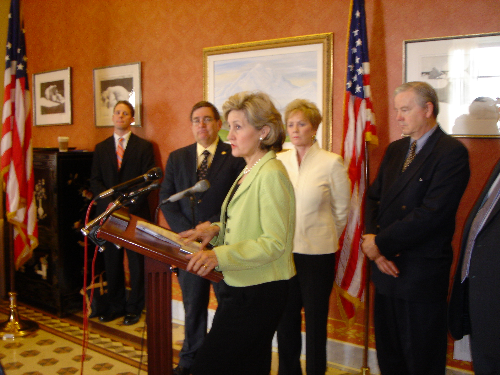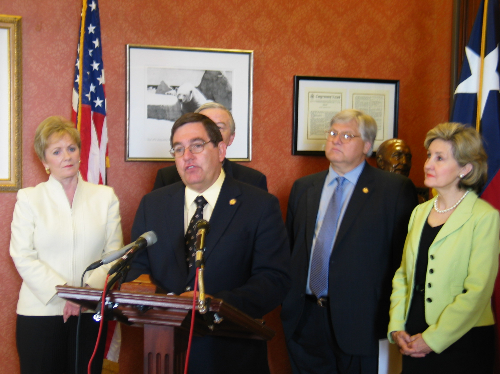Reforming the Wright Amendment - Opening Statement
Washington,
July 12, 2006
Statement by the Honorable Michael C. Burgess, M.D. Reforming the Wright Amendment July 12, 2006 Chairman Mica, Ranking Member Costello, distinguished Members, thank you for holding this important hearing that directly impacts North Texas and the 26th District of Texas. Along with Congressman Marchant, I represent a portion of DFW International Airport, and this issue greatly affects tens of thousands of my constituents who rely on the vitality of this airport. As it has been stated, for almost thirty years, the Wright Amendment has protected a mutual agreement between the City of Fort Worth and the City of Dallas. I believe in the integrity of this agreement, and it has enabled DFW Airport to become the economic engine of North Texas. If we change the terms of the old agreement, the new law must protect the lives and livelihoods of the tens of thousands of people who depend on DFW Airport. Mayor Moncrief and Mayor Miller have each worked diligently, and along with the major stakeholders, I believe that they have entered into an historic agreement that will protect my constituents and allow for better service at Love Field. I sincerely thank the Mayors for their commitment and dedication to this delicate and complicated task. I understand that some of the surrounding cities in North Texas are concerned with clause 6 of the joint agreement, which states that “to the extent any other airport within an eighty-mile radius seeks to initiate scheduled commercial passenger service within this eight-year period, both cities agree to work diligently to bring that service to DFW, or if that effort fails, then to airports owned by the Cities of Dallas and/or Fort Worth.” While I do represent a portion of DFW Airport, I also represent Alliance Airport and Denton Municipal Airport. I believe that the surrounding airports interests must be protected. However, I am pleased that the Mayors made a distinction between commercial passenger service and cargo service. Additionally, most unscheduled charter service is not included in the definition of commercial passenger service, thus surrounding airports will be able to continue their cargo and most charter service without any possible disturbance by the Cities of Fort Worth and Dallas. This is a very important service, and I believe that we should take all necessary measures to protect communities like the City of Denton in providing such service. It should also be noted that this agreement only binds the Cities of Fort Worth and Dallas, American Airlines, and Southwest Airlines. It does not bind the neighboring cities within the eighty miles; therefore, their autonomy should remain unquestioned. I would oppose any measure, whether State or Federal, that would obligate other parties to this agreement. If other parties are subsequently bound by this agreement or any form of legislation, this would be contrary to the intent of the agreement. It is my hope that any proposed legislation remains silent on the issue of preemption. The Dallas Aviation Department has revealed that the department had a $20 million budget shortfall in its two most recent fiscal years combined. While the aviation department has increased their landing fees at Love Field from 35 cents to 55 cents, the Dallas taxpayers are still subsidizing this airport. According to the Dallas Morning News, the landing fee increase will bring in $952,000 to the city annually. This obviously falls short of offsetting the budget deficit. Similarly situated mid-size airports charge an average of $1.40 for landing fees, and I do not understand why the City of Dallas has been reluctant to charge a more fiscally responsible landing fee. While clause 5 of the new joint agreement does provide that landing fees will be adjusted to cover much needed facility and safety improvements, it is my hope that the City of Dallas will rise to the challenge and dramatically increase the fees to a more appropriate level. As with any older facility, modifications need to be made to ensure the safety of the entire area. An increase in landing fees could provide for additional safety improvements that would provide for the wellbeing of those in and around Love Field, including runway expansions and barriers. The citizens of Dallas deserve these safety measures as well as more transparency in the financial records at Love Field. Since the runways at DFW Airport and Love Field are only 8 miles apart, any action that we take on the Wright Amendment must be conscientious of all safety issues for both airports. I have been informed by air traffic controllers at DFW that when directing traffic for the two airports, the air traffic controllers view Love Field as just another runway. This would change drastically if a gate limit was not imposed, since traffic could increase considerably. I feel that the 20 gate limit at Love Field helps to protect our aviation industry and the public, while at the same time not unduly restricting commerce; therefore, I fully support this effort. While I remain supportive of the agreement, as a Representative of Fort Worth, it would have been my desire to see a more equitable DFW Airport Board of Directors. While the Cities of Fort Worth and Dallas jointly own the airport, seven members represent the City of Dallas while only four represent the City of Fort Worth. The City of Fort Worth’s population is growing rapidly, and it is my hope that the issue of board membership will be reviewed in the near future. While I would have preferred for the Wright Amendment to stay intact, I have always believed that the fate of the Wright Amendment should be decided locally between the cities since they are the entities that actually own DFW Airport. If the Wright Amendment is to be modified, it should first come from the local level and not from Washington. Just a few short months ago, the North Texas Delegation charged Mayor Moncrief and Mayor Miller with this difficult task. Considering the history between the two cities, some felt it was an impossible task. However, Mayor Moncrief and Mayor Miller rose to the challenge, and we now have before us a local agreement signed by all major stakeholders. It is now our opportunity to rise to the challenge and, if possible, pass legislation which reflects this agreement. If it is impossible to enact legislation that reflects this agreement, then the Wright Amendment should stay firmly intact. Again, Mr. Chairman, I thank you for having this important hearing, and I offer my assistance to you and the committee regarding all aviation issues that may affect North Texas. |
Latest from twitter
Get the most up to date news from me on Twitter.



